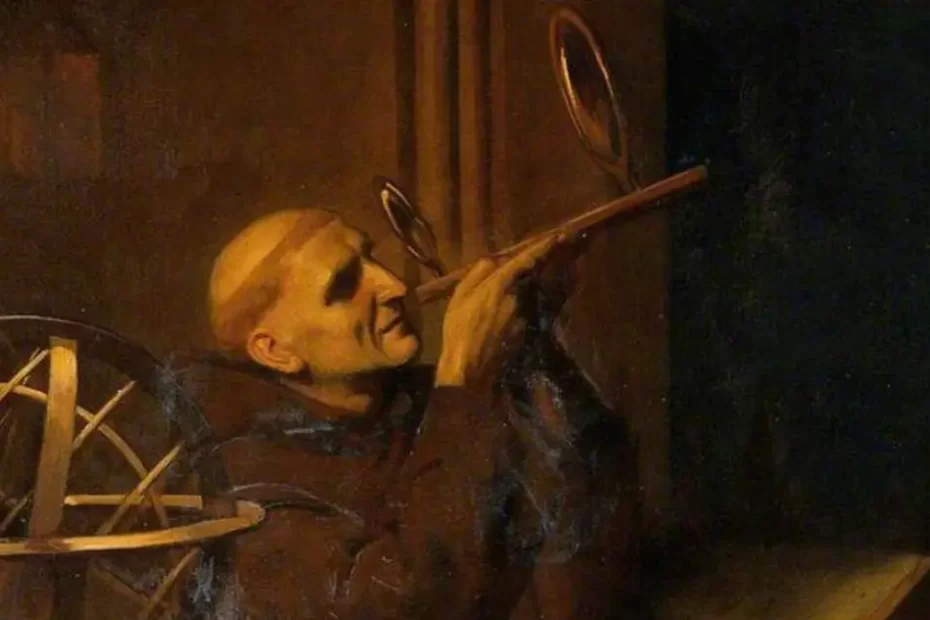Medieval philosopher Roger Bacon was a forward-thinking genius and a controversial figure in 13th-century England. While today he’s known for his contributions to science and philosophy, many of his contemporaries saw him as either a sorcerer or a fool.
Alchemy and Religion: A Unified Science
Roger Bacon is most famous for documenting the recipe for gunpowder, but his work extended beyond scientific experiments. He believed alchemy was the key to ultimate wisdom and spiritual salvation. This belief clashed with the church’s condemnation of alchemy, leading to his imprisonment in 1277. Despite the criticism, Bacon is remembered as one of the top scholars of the 13th century.
Early Education and Knowledge Pursuit
Bacon’s passion for education was clear from a young age. He earned a degree from Oxford University and became an expert on Aristotle’s works. He went on to lecture at the University of Paris on various subjects, including Aristotelian logic, Latin grammar, and the mathematical aspects of astronomy and music.
While in France, Bacon studied optics and conducted groundbreaking experiments that influenced the scientific method. He also studied Greek and Arabic works on optics and introduced the subject to medieval universities.
The Birth of the Scientific Method
Bacon extensively studied Aristotle’s writings but found many of them flawed. This led him to question the reliability of knowledge based solely on logical arguments. He identified four obstacles to the truth: reliance on faulty authority, popular opinions, personal bias, and reliance on rational arguments.
To overcome these, Bacon advocated for the replication of experiments to establish scientific truth. This laid the foundation for the scientific method, although he isn’t credited with its invention. His contributions to inductive reasoning were crucial to the scientific process.
Roger Bacon and the Philosopher’s Stone
Bacon explored alchemy’s connections to nature and medicine and delved into Hermeticism, blending Jewish and Christian mysticism with ancient Egyptian beliefs. This interdisciplinary approach aligned with his quest for knowledge.
In 1257, Bacon joined the Catholic Franciscan Order, attracted by its learning opportunities. As a friar, he was prohibited from publishing works without approval, putting his scholarly pursuits on hold. His desire to reform Christian education led him to seek permission to return to Oxford, where he had a chance meeting with Pope Clement IV.
In a hurry to present his case, Bacon wrote the Opus Majus, a comprehensive work in seven sections, arguing for the study of science and alchemy. The Opus Majus took a year to complete and contained about a million words.
Unfortunately, before Bacon could present his work, Pope Clement IV passed away. Despite this, Bacon’s efforts to champion science and alchemy didn’t go unnoticed. He was imprisoned or placed under house arrest for violating rules against teaching certain philosophies. He eventually returned to Oxford and stayed there until his death around 1292.
A Rediscovered Legacy
After Bacon’s death, many of his manuscripts were lost over time. His works covered a wide range of subjects, including grammar, mathematics, physics, optics, astronomy, chemistry, magic, and alchemy.
For centuries, Bacon’s ideas were controversial, and he was seen as a possessor of forbidden knowledge or a wizard. It wasn’t until the 16th century that philosophers began to recognize his contributions, hailing him as a scientific pioneer. By the 19th century, Bacon’s genius was evident, and his ideas were considered ahead of their time.
While some claims of Bacon’s predictions, like modern cars, airplanes, and submarines, are likely misattributed, he is remembered today as a seeker of universal truths.
